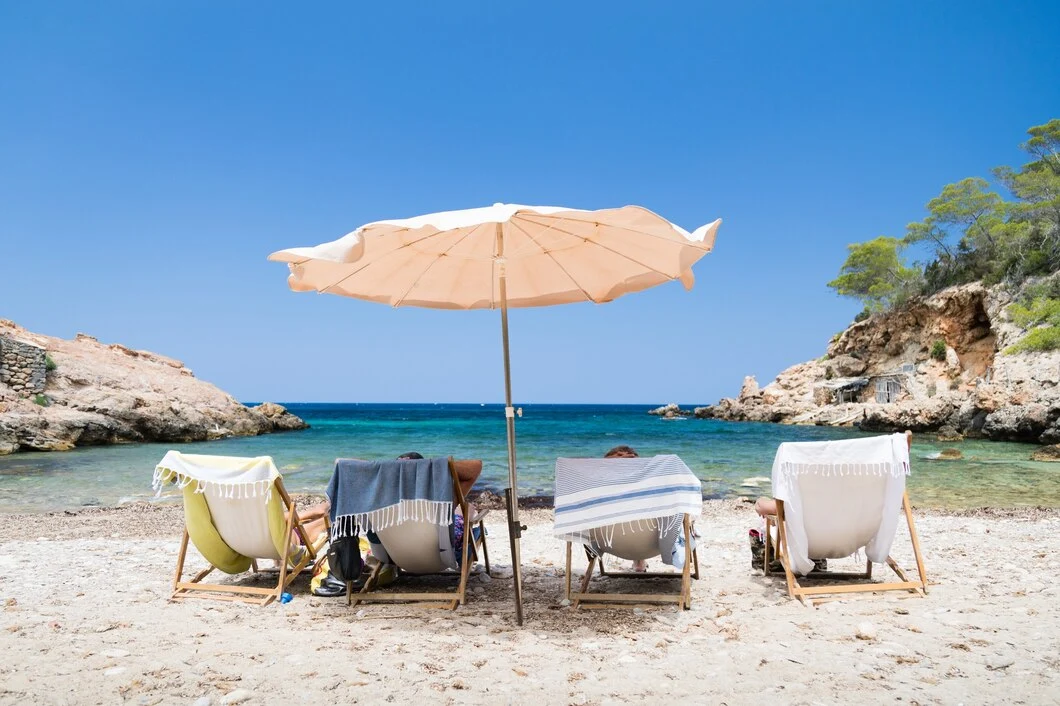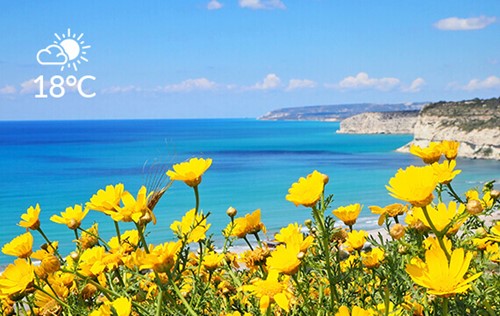A Trip to the Land of the Rising Sun and Mediterranean Breezes
Northern Cyprus, a hidden gem nestled in the Mediterranean Sea, is a paradise for tourists with its golden beaches, historical sites, rich culture, and warm-hearted people. Before packing your bags, read this article to get acquainted with the climate of this enchanting land.
What is the general climate of Northern Cyprus?
With hot and dry summers, mild and rainy winters, pleasant springs and autumns, and diverse weather patterns in different regions, Northern Cyprus is an attractive destination for tourists throughout the year.
Climate Diversity:
Coastal Region: A warm and humid Mediterranean climate prevails in coastal areas.
Highlands: In higher elevations, the temperature is cooler and rainfall is higher.
North and South: Northern Cyprus is slightly cooler and more humid than the south.
What are the hottest and coldest months of the year?
In general, this country does not have harsh and unbearable weather. However, the hottest and coldest months of the year are:
Hottest Months: July and August, with average temperatures ranging from 28 to 33 degrees Celsius (82 to 91 degrees Fahrenheit), are the hottest months of the year in Northern Cyprus. During these months, the days are sunny and long, and rainfall is low.
Coldest Month: January, with an average temperature of 10 degrees Celsius (50 degrees Fahrenheit), is the coldest month of the year in Northern Cyprus. During this month, the days are short and cool, and rainfall is higher.
Points to Note:
Summer: The heat in Northern Cyprus, especially in July and August, can be considered hot for some people. If you are looking for cooler weather, it is best to travel to Northern Cyprus in the spring (March to May) or autumn (September to November) months.
Winter: Winter in Northern Cyprus is mild and it rarely snows. However, if you are looking for winter sports, you can head to the Troodos Mountains in southwestern Cyprus, where ski slopes are available in winter.
In general, Northern Cyprus has a Mediterranean climate with hot and dry summers and mild and rainy winters. By choosing the right season to travel, you can enjoy all the beauty and attractions of this enchanting land.
Precipitation in Northern Cyprus
The average annual rainfall in Northern Cyprus is around 500 millimeters. This amount of precipitation is not evenly distributed throughout Northern Cyprus and varies in different parts of the island.
Mountainous Regions: In mountainous areas, rainfall can reach up to 1000 millimeters or more. This is due to both the higher altitude of these areas and the concentration of clouds.
Plains: In the plains, especially the Mesaoria plains in eastern Cyprus, rainfall is around 325 millimeters.
Coastal Areas: In coastal areas, the average annual rainfall is between 400 and 500 millimeters.
Rain in Northern Cyprus mainly occurs during the winter season (from December to February). During this season, the average rainfall is between 100 and 200 millimeters per month. In the summer months (from June to August), rainfall is very low, averaging less than 10 millimeters per month.
Air humidity in Northern Cyprus is generally moderate. During the summer, the average humidity is between 60 and 70%. In winter, the average humidity is between 70 and 80%.
Rainfall in Northern Cyprus can affect various activities, including agriculture, tourism, and water sports.
Given that the amount of rainfall in Northern Cyprus varies in different regions and throughout the year, it is essential to check the weather forecast for the area you intend to visit before traveling to this country.
Spring in Northern Cyprus
Spring in Northern Cyprus is a season of freshness, beauty, and life. It is as if nature has awakened from its winter slumber and welcomes visitors with all its glory. In this delightful season, you will witness the awakening of flowers and plants, the emergence of colors in the plains and mountains, and the singing of birds in the sky.

Spring Weather in Northern Cyprus
Mild and Pleasant: In spring, the average temperature in Northern Cyprus ranges between 18 and 25 degrees Celsius (64 to 77 degrees Fahrenheit). This weather is neither hot and exhausting nor cold and annoying, making it ideal for sightseeing and enjoying nature.
Seasonal Rainfall: In spring, we witness seasonal rainfall that adds to the freshness and greenery of nature. This rainfall is usually short-lived showers and rarely leads to floods or storms.
Humidity: The average air humidity in spring is between 60 and 70%. This humidity level is neither high enough to make the air muggy nor low enough to make the air dry and suffocating.
Spring Nature in Northern Cyprus:
Spring Blossoms: In spring, the plains and mountains of Northern Cyprus are filled with colorful spring flowers. Tulips, daffodils, hyacinths, and violets are among the flowers that grow abundantly in Northern Cyprus during this season.
Greenery: With seasonal rainfall and warming temperatures, plants and trees grow rapidly, and the plains and mountains turn emerald green.
Migratory Birds: In spring, migratory birds return from tropical regions to Northern Cyprus and fill the sky with their melodious songs.
Spring Activities:
- Hiking and Cycling: The mild and pleasant spring weather provides an excellent opportunity for hiking and cycling in the pristine nature of Northern Cyprus.
- Exploring Historical Sites: In spring, you can visit the historical sites of Northern Cyprus, such as ancient castles, mosques, and churches, without worrying about the sweltering summer heat.
- Festivals: In spring, there are various festivals held in Northern Cyprus. The Tulip Festival, the Food Festival, and the Music Festival are among the festivals that take place in Northern Cyprus during this season.
If you are looking for an unforgettable trip in pristine nature full of freshness, don’t miss the spring of Northern Cyprus.
Summer Weather in Northern Cyprus
Summer in Northern Cyprus is a hot, sunny, and vibrant season. This season is the best time to enjoy the beautiful beaches, water sports, and various outdoor activities.

Hot and Summery Weather:
- Warm and Sunny: In summer, the average temperature in Northern Cyprus ranges between 28 and 33 degrees Celsius (82 to 91 degrees Fahrenheit). Days are sunny and long, and rainfall is very low.
- Humidity: The average air humidity in summer is between 60 and 70%. This humidity level is neither high enough to make the air muggy nor low enough to make the air dry and suffocating.
- Sea Breezes: In summer, cool sea breezes blow from the Mediterranean towards Northern Cyprus, somewhat moderating the heat.
Beautiful Beaches of Northern Cyprus:
- Blue and Clear: With crystal-clear turquoise waters, golden sands, and bright sunshine, the beaches of Northern Cyprus are an ideal destination for sunbathing, swimming, and water sports such as diving, jet skiing, and boating.
- Bustling and Lively: In summer, the beaches of Northern Cyprus are filled with tourists from all over the world. These beaches are ideal places for fun, entertainment, and meeting new people.
- Family-Friendly: Many beaches in Northern Cyprus have good facilities and services for families, including playgrounds, children’s pools, and restaurants.
Summer Activities in Northern Cyprus:
- Sunbathing and Swimming: The beautiful beaches of Northern Cyprus are the best places to sunbathe and enjoy the warm summer weather.
- Water Sports: A wide range of water sports such as diving, jet skiing, boating, waterskiing, and parasailing can be enjoyed on the beaches of Northern Cyprus.
- Sightseeing: In summer, you can visit the historical sites of Northern Cyprus, such as ancient castles, mosques, and churches.
- Festivals: In summer, there are various festivals held in Northern Cyprus. The Horn Music Festival, the International Theater Festival, and the Food Festival are among the festivals that take place in Northern Cyprus during this season.
Autumn Weather in Northern Cyprus
Autumn in Northern Cyprus is a delightful and colorful season that brings a combination of the gentle warmth of summer and the refreshing coolness of winter. This season is an ideal opportunity to enjoy the pristine nature of Northern Cyprus, explore historical sites, and experience autumnal flavors.

Autumn Weather:
- Mild and Pleasant: In autumn, the average temperature in Northern Cyprus ranges between 20 and 25 degrees Celsius (68 to 77 degrees Fahrenheit). Days are warm and sunny, and nights are cool and refreshing.
- Scattered Rainfall: Autumn is a relatively dry season in Northern Cyprus, but there are scattered showers throughout this season. These showers add to the freshness and greenery of nature.
- Humidity: The average air humidity in autumn is between 60 and 70%. This humidity level is neither high enough to make the air muggy nor low enough to make the air dry and suffocating.
Autumnal Nature in Northern Cyprus:
- Autumn Colors: In autumn, trees in Northern Cyprus turn into beautiful autumn colors like yellow, orange, and red, creating a breathtaking landscape.
- Pristine Nature: As the weather cools, the pristine nature of Northern Cyprus becomes an ideal place for hiking, cycling, and camping.
- Autumn Fruits: Autumn in Northern Cyprus is the harvest season for many autumn fruits such as grapes, figs, apples, and pears.
Autumn Activities in Northern Cyprus:
- Nature Walks: Autumn in Northern Cyprus is an ideal season for exploring the country’s pristine nature and enjoying the autumn colors.
- Visiting Historical Sites: In autumn, you can visit the historical sites of Northern Cyprus, such as ancient castles, mosques, and churches, without worrying about the sweltering summer heat.
Autumn Festivals: In autumn, there are various festivals held in Northern Cyprus, including the Grape Festival, the Olive Festival, the Traditional Music Festival, the Film Festival, and most importantly, the International Food Festival.
Winter Weather in Northern Cyprus
Mild and Rainy
Winter in Northern Cyprus is a mild and rainy season that, despite the increased rainfall, still offers pleasant weather and various opportunities for recreation and entertainment.
Weather in Winter:
- Mild and Rainy: In winter, the average temperature in Northern Cyprus ranges between 10 and 15 degrees Celsius (50 to 59 degrees Fahrenheit). Days are cool and short, and nights get colder. Rainfall is higher during this season, but overall, winters in Northern Cyprus are mild and humid.
- Snow: Snowfall is rare in Northern Cyprus, but you may see snow in higher elevations like the Troodos Mountains.
- Humidity: The average air humidity in winter is between 70 and 80%. This humidity level is neither high enough to make the air muggy nor low enough to make the air dry and suffocating.
Winter Activities in Northern Cyprus:
- Skiing: In winter, you can go skiing and enjoy other winter sports in the Troodos Mountains in southwestern Northern Cyprus.
- Hiking: Despite the rainfall, winter in Northern Cyprus is an ideal season for hiking in nature and enjoying the cool and humid air.
- Visiting Historical Sites: You can also visit the historical sites of Northern Cyprus, such as ancient castles, mosques, and churches, in winter.
- Winter Festivals: In winter, there are various festivals related to Christmas and New Year in Northern Cyprus, which are a great opportunity to get acquainted with the country’s culture and customs. Also, if you are traveling to this country in winter, don’t miss the Lemon Dance and Music Festival and the Kite Festival!

Determining the Best City in Terms of Weather in Northern Cyprus
Deciding which city in Northern Cyprus has the “best” climate depends on your individual preferences and needs. Each city offers a unique climate with its own set of advantages and disadvantages.
Factors to Consider
When deciding which city has the best climate for you, consider the following factors:
- Season: Do you prefer warm summers, mild winters, or a combination of both?
- Temperature: What is your ideal temperature range?
- Rainfall: Do you enjoy rainy weather or prefer drier conditions?
- Humidity: How do you feel about humidity levels?
- Activities: What outdoor activities do you enjoy?
- City Climate Summaries
To help you make an informed decision, here is a summary of the climates in four popular cities in Northern Cyprus:
Nicosia
Nicosia, the capital of Northern Cyprus, has a hot-summer Mediterranean climate characterized by hot, dry summers and mild, wet winters.
- Climate Type: Hot-summer Mediterranean
- Average Temperature: 31°C (88°F) in July (hottest month), 10°C (50°F) in January (coldest month)
- Rainfall: 500 mm (20 inches) annually
- Pros: Long, sunny summers, mild winters, capital city, easy access to other parts of Northern Cyprus
- Cons: Hot summers, high humidity in summer, more rain than some coastal cities
Kyrenia
Kyrenia, one of Northern Cyprus’ most popular cities, captivates visitors with its hot, sunny summers, mild, wet winters, vibrant springs, and charming autumns. Kyrenia’s diverse and pleasant climate makes it an ideal destination for those seeking to enjoy a variety of weather conditions.
- Climate Type: Hot-summer Mediterranean
- Average Temperature: 33°C (91°F) in July (hottest month), 12°C (54°F) in January (coldest month)
- Rainfall: 350 mm (14 inches) annually
- Pros: Long, sunny summers, mild winters, beautiful beaches, scenic views
- Cons: Hot summers, relatively high humidity in summer, low rainfall
Famagusta
Famagusta, a historically rich city on Northern Cyprus’ eastern coast, offers a Mediterranean climate with hot, dry summers and cool, wet winters.
- Climate Type: Hot-summer Mediterranean
- Average Temperature: 32°C (90°F) in July (hottest month), 11°C (52°F) in January (coldest month)
- Rainfall: 400 mm (16 inches) annually
- Pros: Long, sunny summers, mild winters, historic city, beautiful beaches
- Cons: Hot summers, high humidity in summer, moderate rainfall
Karpaz
The Karpaz, known for its pristine beaches, tranquil atmosphere, and wild natural beauty, experiences a subtropical Mediterranean climate with warm, dry summers and mild, wet winters.
- Climate Type: Subtropical Mediterranean
- Average Temperature: 30°C (86°F) in July (hottest month), 10°C (50°F) in January (coldest month)
- Rainfall: 380 mm (15 inches) annually
- Pros: Warm, dry summers, mild winters, unspoiled nature, tranquil atmosphere
- Cons: Less developed than other regions, fewer tourist facilities

